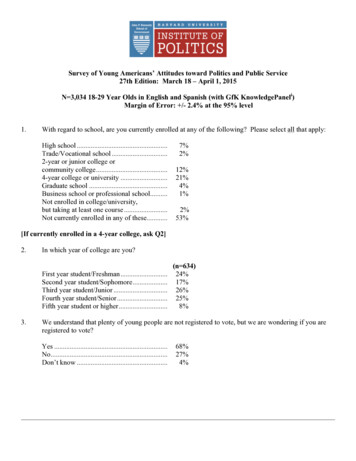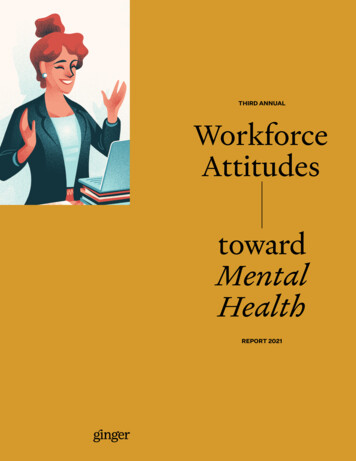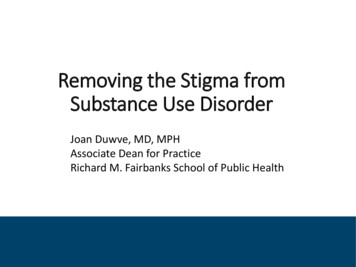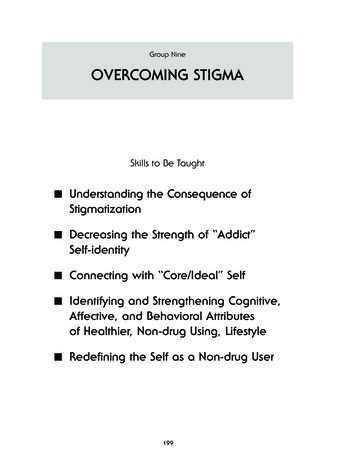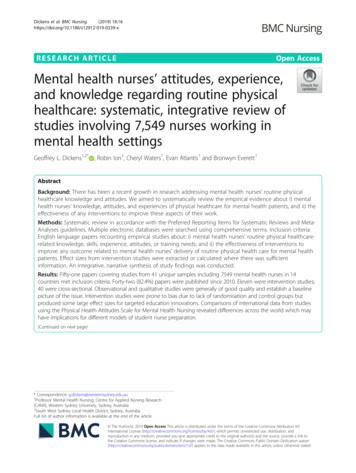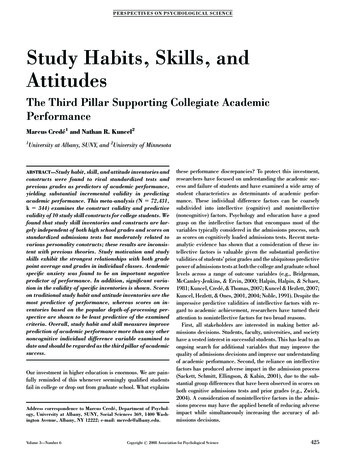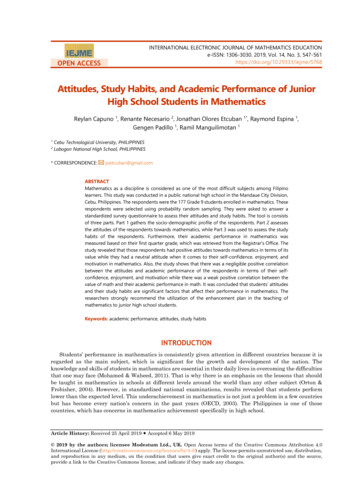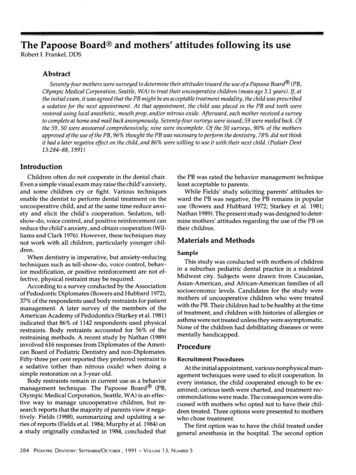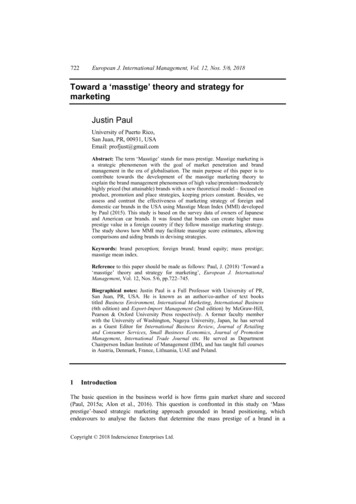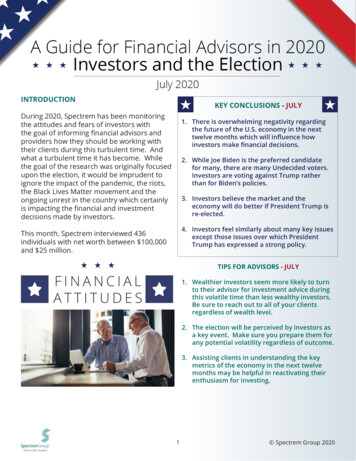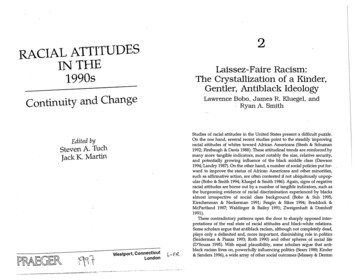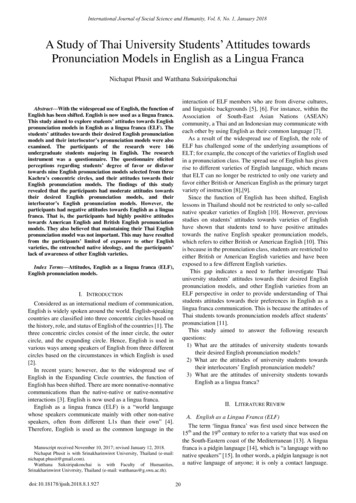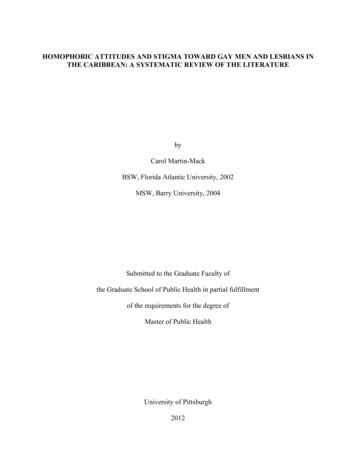
Transcription
HOMOPHOBIC ATTITUDES AND STIGMA TOWARD GAY MEN AND LESBIANS INTHE CARIBBEAN: A SYSTEMATIC REVIEW OF THE LITERATUREbyCarol Martin-MackBSW, Florida Atlantic University, 2002MSW, Barry University, 2004Submitted to the Graduate Faculty ofthe Graduate School of Public Health in partial fulfillmentof the requirements for the degree ofMaster of Public HealthUniversity of Pittsburghi2012
UNIVERSITY OF PITTSBURGHGRADUATE SCHOOL OF PUBLIC HEALTHThis thesis was presentedbyCarol Martin-MackIt was defended onDecember 6, 2012and approved byMark S. Friedman, MSW, MPA, PhD, Assistant Professor, Behavioral and CommunityHealth Sciences, Graduate School of Public Health, University of PittsburghCandace M. Kammerer, PhD, Associate Professor, Department of Human Genetics,GraduateSchool of Public Health, University of PittsburghThesis Director: Martha Ann Terry, BA, MA, PhD, Assistant Professor, Director, Master ofPublic Health Program, Behavioral and Community Health Sciences, Graduate School ofPublic Health, University of Pittsburghii
Copyright by Carol Martin-Mack2012iii
HOMOPHOBIC ATTITUDES AND STIGMA TOWARD GAY MEN AND LESBIANSIN THE CARIBBEAN: A SYSTEMATIC REVIEW OF THE LITERATURECarol Martin-Mack, MPHUniversity of Pittsburgh, 2012Violent acts against gay men and lesbians are common in the Caribbean, including rape andassault. Widespread violence and attacks against homosexuals have prompted a human rightsgroup to confer on one Caribbean country, Jamaica, the distinction of being the mosthomophobic place on earth. Homophobic ideology and stigma toward gay men and lesbians inthe Caribbean can be observed in the interactions of various institutions such as the church, thehealth care system, the laws, the police, the government, formal culture (e.g., newspapers), andpopular culture (e.g., music). This master’s thesis is based on a review of literature concerninghomophobic attitudes and stigma toward gay men and lesbians in the Caribbean, including:British colonial laws known as “Sodomy and Buggery” laws, newspaper articles, dancehallmusic, and calypso music. This literature analysis will assess the public health impact of suchattitudes and stigma, particularly how stigmatization from community members leads gay menand lesbians into hiding because of their sexual behavior. Also, this thesis explores other publichealth issues related to gay men and lesbians, including: isolation in the community, alienationfrom family members, depression, emotional distress, physical torture, murder, and negativehealth outcomes of being stigmatized.iv
TABLE OF CONTENTSPREFACE . VIII1.0INTRODUCTION . 12.0BACKGROUND . 42.1CARIBBEAN COUNTRIES OF INTEREST . 62.2TRINIDAD AND TOBAGO . 72.3JAMAICA . 82.4BAHAMAS . 92.5BARBADOS . 92.6SAINT KITTS AND NEVIS . 102.7SAINT VINCENT AND THE GRENADINES . 113.0METHODS . 123.1CRITERIA FOR INCLUSION AND EXCLUSION OF LITERATURE . 123.2ARTICLE RETRIEVAL . 134.0A DESCRIPTION OF FACTORS THAT IMPACT HOMOSEXUAL HEALTHAND WELL-BEING BASED ON THE SOCIAL-ECOLOGICAL MODEL . 154.1INTRAPERSONAL LEVEL . 164.2INTERPERSONAL LEVEL . 174.3INSTITUTIONAL LEVEL. 18v
4.3.1Image of the macho man . 204.3.2Homophobic attitudes and stigmas . 224.4COMMUNITY LEVEL . 244.5PUBLIC POLICY LEVEL . 274.5.1Colonial Sodomy and Buggery Laws . 294.5.2Trinidad and Tobago . 294.5.3Jamaica . 314.5.4Bahamas . 324.5.5Barbados . 334.5.6Saint Vincent and the Grenadines . 334.5.7Saint Kitts and Nevis . 344.5.8Caribbean laws invade the privacy of gay men and lesbians and createinequality. 355.0IMPACT ON HEALTH . 376.0CONCLUSION. 41APPENDIX A WHY ARE HOMOSEXUAL ACTS ILLEGAL IN JAMAICA? . 43APPENDIX B CHART ILLUSTRATING HOMOPHOBIC LYRICS . 44APPENDIX C DANCEHALL DOSSIER:STOP MURDER MUSIC . 55BIBLIOGRAPHY . 64vi
LIST OF FIGURESFigure 1 A map of the Caribbean Islands (world atlas) . 7Figure 2 The Social Ecological Model of factors that influence homosexuals’ health andwellbeing (McLeroy et al., 1988). . 16vii
PREFACEI would like to acknowledge the contribution and support of my thesis committee: Dr. MarthaTerry, Dr. Mark Friedman, and Dr. Candace Kammerer. I would like to extend a special thankyou to Dr. Terry for all the feedback she gave me on my thesis topic.I was born in Jamaica and migrated to the United States in 1984 when I was 18 years old.I was unaware of gay men and lesbians in my community during my childhood in Jamaica.Since migrating to the U.S., I remained unaware of the widespread homophobic attitudes inJamaica and other Caribbean countries until 1992, when I was introduced to a song by BujuBanton, a Jamaican dancehall artist whose lyrics encouraged killing gay men and lesbians. Myconversations with family members and friends about violent and homophobic lyrics in much ofCaribbean music revealed a startling number of negative and homophobic responses.This experience led to my interest in learning about the causes of homophobic attitudestoward gay men and lesbians in Caribbean countries and what keeps homophobic attitudesingrained in Caribbean culture. Some Caribbean music such as calypso and dancehall lyrics inthe 1980s and 1990s perpetrate ignorance and homophobic stigma toward gay men and lesbiansby blaming gay men and lesbians for spreading AIDS in the Caribbean. Many Jamaicandancehall songs, said to be “blood-curdling,” have a significant influence on many Caribbeanmusic enthusiasts; as a result, the homophobic lyrics of these songs encourage and reinforcehomophobic attitudes. The following is an excerpt from a song by Elephant Man that shedsviii
insight into the degree of hatred and controversial homophobic lyrics toward gay men andlesbians (translated by Carol Martin-Mack, written in brackets):A Nuh Fi Wi Fault By Elephant Man Scaredem Crew (Bruk out Ridim):Badman nuh inna nuh explanation no more[Gangsters don’t have to explain themselves]Anyway we hold dem bwoy dem get[Whatever we do to those boys they have to deal with it]A yo, all yuh hear meTivali jungle[All of those that live in the area called Tivolu Jungle hear me now]Rise all da ting dem yah man[Raise the guns]Verse 1A nuh fi wi faultIf a battybwoy run inna we gun[It’s not our fault if gay guys run into our guns]A nuh fi wi faultThe pussy dem get shot down[It’s not our fault those pussies got shot down]A nuh fi wi faultWhen fadda get boom down Sodom[It’s not our fault that God destroyed the city of Sodom]A nuh fi wi fault, A nuh fi wi faultA nuh fi wi, A nuh fi wi fault[It’s not our fault they found a gay guy with his head missing]Dem find battyman we don't playA nuh fi wi faultAlong time deh fassy dem a dead[They were condemned to die and that’s not our fault]A nuh fi wi faultAh dem make de syphilis a spread[Gays are responsible for spreading syphilis]A nuh fi wi fault, A nuh fi wi fault[It’s not our fault]A nuh fi wi, But a fi wi faultWhen yuh hear a Sodomite get raped[But it is our fault when you hear a lesbian got rape]But a fi wi fault, When we have a gal in her placeA nuh fi wi fault, When twenty gal wash we place[But it is our fault when we have not only 1 girl but 20 girls washing our plates]ix
[Yes that is our fault]But a fi wi fault, But a fi wi faultA! denVerse 2Long time we ah warn dem anna obverse[We have been warning for a long time that gayness is wrong]Battyman fi dead! Unnu Please mark we word[Please listen, give me my tech nine so I can shoot them]Gimme tha tech-nineShoot dem like birdDis a whe guard man heardA nuh fi wi faultJamaican don't like gay[It’s not our fault that Jamaicans don’t like gays]A nuh fi wi faultAh same way Miami man stay[It’s the same way men in Miami are]A nuh fi wi faultAh same way Walter man stayA nuh fi wi fault, nuh fi wi faultA nuh fi wi, A nuh fi wi faultWhen we ah bun tha fire hard[It’s not our fault we are strongly against gay men]A nuh fi wi faultI we gwine bun de fassy dem abroad[We are going to fight against gays abroad also]A nuh fi wi faultAnd de same way we a bun dem ah yardA nuh fi wi fault, A nuh fi wi faultA nuh fi, But ah fi wi faultWhen de poorer class ah get rich[But it is our fault when you see the poor getting rich and the bad roads gettingfixed]But ah fi wi fault, When we see the bad road dem a fixIt is very clear that this song advocates that homosexuals are responsible for spreading syphilis,lesbian women should be raped, and that homosexual men and women should have no rights. Itis lyrics like these that motivated me to explore the public health impact of homophobic attitudesin laws, formal culture, and popular culture in the Caribbean.x
1.0INTRODUCTIONMany gay men and lesbians living in Caribbean countries live in fear due to homophobicattitudes and stigma that stem from Christian influences, music with anti-gay sentiment, and theBritish colonial Sodomy and Buggery laws, which prohibit engaging in sexual activities orhaving a relationship with a same-sex partner (Williams, 2005a; LaFont, 2001; Human RightsWatch, 2008). As Williams (2005b) stated, “The stigma attached to homosexuality and thoseliving with HIV/AIDS prevails across much of the Caribbean, where Victorian-era and antisodomy laws remain on the books in at least 11 countries, and politicians courtingfundamentalist Christian constituencies are loath to contest them” (p. 2). Gay men and lesbiansin the Caribbean are considered oppressed because of homophobic attitudes, stigma, andviolence against them have impeded upon their basic human rights (Charles, 2011; Faucette,2010 Human Rights Watch, 2004). Many people in the Caribbean denounce gay men andlesbians publicly, which contributes to anti-gay violence and homophobic attitudes (Charles,2011). Murray (2012) states:I will argue that hegemonic discourse about homosexuality in the Caribbean media areproduced through a heterosexual patriarchal logic originating in a first-wave form ofglobalization known as colonialism.[and the] uneven processes of economic, political,and cultural globalization over the past twenty years (p. 17).According to Charles (2011) the widespread violence and attacks against homosexuals inJamaica prompted several human rights groups, such as the Human Rights Watch of Britain and1
the gay community in the United Kingdom, to describe Jamaica as one of the most homophobiccountries in the world. The endemic violence against gay men and lesbians in Jamaica and theCaribbean more broadly is a major problem for various reasons, and the failure of police toadequately respond allows such violence to continue unabated, increasing the likelihood thatwidespread violence will continue to have a negative impact on the homosexual community(Sharpe & Pinto, 2006 ; Williams, 2005a ).A major public health concern for gay men and lesbians is the fact that stigmas attributedto homosexuality prevent many gay men and lesbians from seeking HIV testing, treatment, andprevention(Carr, 2002; Rutledge, Abell, Panmore, McCann, 2009; Williams, 2005a).Homophobic attitudes, discrimination, and fear prevent many gay men from openly revealingtheir sexual orientation to a healthcare worker or from getting tested for HIV because patientconfidentiality is often violated (Padgett, 2005; Williams, 2005a). The fact that many gay menand lesbians are not getting tested compounds the risk of HIV/AIDS spreading in the Caribbean(White & Carr, 2005). Caribbean government healthcare officials are unable to effectivelyassess the number of HIV/AIDS patients for the purpose of allocating funding for preventionprograms and treatments (according to United Nations General Assembly Special Session onHIV/AIDS, 2006).Also, cultural taboos about homosexuality and HIV/AIDS impedeindividuals’ access to healthcare resources such as HIV/AIDS education and STD/HIVawareness programs and treatments.The intent of this thesis is to 1) analyze the cultural origins of homophobia in theCaribbean by considering the history of homophobia, intolerance, and stigma towardhomosexuals in the Caribbean, 2) use the social ecological model to describe factors that impactthe health and well-being of homosexuals in the Caribbean, and 3) describe the impact of2
homophobia on this population’s health. These goals will be accomplished through a review ofthe literature that addresses the impact of the British colonial laws, Christianity, culture, andpopular music with homophobic lyrics. Ottosson (2008) noted that the British colonial penalcodes that criminalize gay men and lesbians for engaging in consensual same-sex activitiescontinue to be enforced in more than 80 countries around the world (including eleven Caribbeancountries).Also, this study will review relevant literature from Williams, Lafont, Carr,Christopher Charles, Alexander, and others. For example, M. Jacqui Alexander, who was born inTrinidad and Tobago, wrote a detailed account of her life as a lesbian living in the Caribbean andhow the Sexual Offences Act of 1986 impacted the lives of gay men and lesbians.TheCaribbean governments should repeal the “Sodomy and Buggery” laws. Also, Caribbeangovernment leaders must speak out forcefully in defense and promotion of sexual rights,including clear messages that discrimination based on sexual orientation and gender identify areinhumane, wrong, and subject to punishment.3
2.0BACKGROUNDHomophobic attitudes in the Caribbean are a result of a number of historical and cultural factors.“Informal social knowledge” such as print media, dancehall music, and fictional stories aboutgay men and lesbians has led many citizens to negatively view gay men and lesbians inCaribbean culture. Other major influences include British colonial laws and religious views(Kirby, 2011).In the Caribbean, laws that prohibit same-sex activity have a negative impact on thehomosexual community. These laws date back to the 15th century, when England imposed itsfirst secular law for example in Jamaica against the immoral act of the “abominable vice ofbuggery,” which made it a crime for gay men to engage in sexual acts; men who engaged in suchbehavior were often penalized by hanging (LaFont, 2001). These laws punished homosexuals inthe Caribbean for engaging in same-sex activities by defining same-sex sexual behavior as acrime (Kirby, 2011). As Kirby (2011) notes:Although there were variations in the concepts, elements and punishments for therespective same-sex offences in the several colonies, provinces and settlements of theBritish Empire, a common theme existed. Same-sex activity was morally unacceptable tothe British rulers and their society (p. 28).From the 18th century to the present, same-sex sexual activities, especially between men,were referred to in the Caribbean as “unnatural acts” and “crimes against nature” (Human RightsWatch, 2008). Alexander (1994) writes that the Buggery Act, which dates back to British4
colonial rule and prohibits homosexual relationships, was part of King Henry VIII’s fight todamage the reputation of the Catholic Church in order to acquire its assets.Another aspect of Caribbean life that came to the islands through the colonialists was theinfluence of religion, particularly Christianity. Several sources link Caribbean homophobia atleast partially with religious conservatism regardless of the religion (Amber, 2009; Carr, 2002;Faucette, 2010; Genrich & Brathwaite, 2005; Williams, 2005b) (see appendix A comments froma former Jamaican Prime minister about religion). Religion is a very important part of everydaylife in the Caribbean. Christianity is the predominant religion in Jamaica and the rest of theCaribbean countries, and on Saturdays and Sundays, the churches are filled with children andadults reading the Bible. For example, Scott-Williams (2011) notes that there is a “church onalmost every street corner” and that Jamaica is listed in the Guinness Book of World Records asthe “country with the most churches per square mile” (p. 1).Many people in Caribbean countries believe that homosexuality is a sin and that thesodomy laws should not be abolished. The term “sodomy” was taken from the Bible (Sodom isthe name of a place in the Book of Genesis 19:1-8), and it was used in the 11th century by SaintPeter Damien to connect “condemned sexual activity” with this biblical reference.The social-ecological model will be used to look at issues related to homosexuality andhealth behavior in the Caribbean. Sallis, Owen, and Fisher (2008) discuss the connectionbetween organisms and society and how this relationship impacts long-term behavior change onall levels. Social-ecological models address these five core levels: intrapersonal, interpersonal,institutional, community, and public policy. The intent of this thesis is to open a public healthdialogue about issues that relate to gay men and lesbians in the Caribbean by examining: 1) howthe portrayal of gay men and lesbians in the Caribbean discourse leads to stigmatization and5
homophobic attitudes, and 2) the multiple influences on the health behaviors of gay men andlesbians at the intrapersonal, interpersonal, organizational, community, and public policy levels.Homophobic attitudes, discrimination
BSW, Florida Atlantic University, 2002 . MSW, Barry University, 2004 . Submitted to the Graduate Faculty of . the Graduate School of Public Health in partial fulfillment . of the requirements for the degree of . Master of Public
